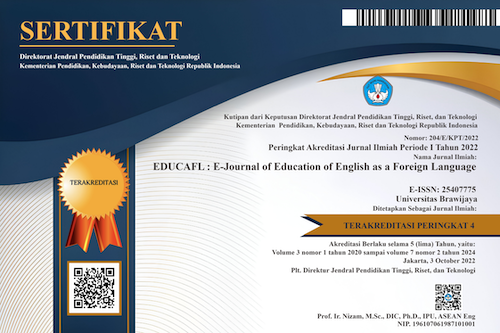Improving Student’s Higher Order Thinking Skills (HOTS) through Jigsaw
DOI:
https://doi.org/10.21776/ub.Educafl.2019.002.02.06Keywords:
jigsaw, Higher Order Thinking Skills (HOTS), academic readingAbstract
This Classroom Action Research aims to improve students’ HOTS (High Order Thinking Skills)  through the application of jigsaw. This study was based on a model proposed by Elliott and was implemented for three cycles. The subjects were 15 students of the third semester students of English department taking  Academic Reading course.The data collection instruments include observation, test,   and documentation. The data were obtained from pre and post-test of each cycle. The findings revealed that jigsaw learning models could increase students’ HOTS (High Order Thinking Skills). Jigsaw is able to boost students participation into an active learning and it can also improve student’s HOTS (High Order Thinking Skills)  as jigsaw itself will be followed by other activities like asking questions, discussing in groups, analyzing the results and providing feedback.
References
Anderson, L.W. & Krathwohl, D.R. (Eds). 2015. Kerangka landasan untuk pembelajaran, pengajaran, dan asesmen: revisi taksonomi pendidikan Bloom.(Terjemahan Agung Prihantoro). Yogyakarta: Pustaka Pelajar. (Buku asli diterbitkan tahun 2001).
Anonymous.https://cd1.edb.hkedcity.net/cd/maths/en/ref_res/material/hots_e/5Skill_e.pdfExperience. Retrieved January 2, 2019.
Charania, et al. Playing jigsaw: A cooperative learning experience.Journal of Nursing
Education; Dec 2001; 40, 9; ProQuest Research Library pg. 420. Retrieved January 14,
Dhage et, al 2016. The Effect of the Jigsaw-Based Cooperative Learning Method on
Engineering Students. Special Issue of National Conference NCIEME 2016 Organised
by Rajarambapu Institute of Technology and Walchand College, Sangli ISSN 2394 –
Retrieved January 14, 2019.
Elliott, J. 2001. Action Research for Educational Change. Reprinted 7. Philadelphia, USA: Open University Press.
Jacobs, E. 1999. Cooperative Learning in Context: An Educational Innovation in Everyday Classrooms. Albany: State University of New York Press.
Kagan, S & Kagan, M. 2009. Kagan Cooperative Learning.San Clemente:Kagan Publishing
Kessler, C. 1992. Cooperative Language Learning: A Teacher’s Resource Book (Eds.). Englewood Cliffs: Prentice Hall, Inc.
Noor, A.M. 2009. Pedagogical Issues in Integrating Thinking Skills in The Classroom. International Journal for Education Studies, 2(1):55-68.
Slavin, R. E. (994. Cooperative Learning: Theory, Research, and Practice (Second Edition). Boston: Allyn and Bacon.
Sudjana, N. 2011. Penilaian Hasil Proses Belajar Mengajar. Bandung: Remaja Rosdakarya.
Ulrich, D., & Glendon, K. 1995. Jigsaw: a critical thinking experience. Nurse educator, 20(3), 6-7.
Downloads
Published
Issue
Section
License
Authors who publish with this journal agree to the following terms:
- Authors retain copyright and grant the journal right of first publication with the work simultaneously licensed under a Creative Commons Attribution License that allows others to share the work with an acknowledgement of the work's authorship and initial publication in this journal.
- Authors are able to enter into separate, additional contractual arrangements for the non-exclusive distribution of the journal's published version of the work (e.g., post it to an institutional repository or publish it in a book), with an acknowledgement of its initial publication in this journal.
- Authors are permitted and encouraged to post their work online (e.g., in institutional repositories or on their website) prior to and during the submission process, as it can lead to productive exchanges, as well as earlier and greater citation of published work (See The Effect of Open Access).



